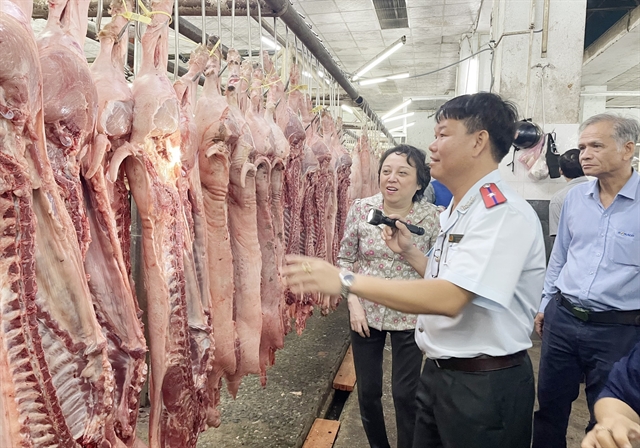 |
| The inspection team from HCM City’s Food Safety Management Board inspects imported pork at the Hóc Môn wholesale market. — VNA/VNS Photo |
HÀ NỘI — The Central Interdisciplinary Steering Committee on Food Safety has established five inspection teams to strengthen inspections on food safety and hygiene at businesses that produce, process, and import food, as well as wholesale markets and supermarkets in 10 cities and provinces nationwide.
The inspection plan, which lasts from December 20, 2023, to March 15, 2024, aims to ensure food safety and hygiene of food commonly used during the Lunar New Year and other spring festivals, prevent the production and sale of counterfeit or low-quality food, and ensure the rights of consumers.
Team 1, led by the Food Safety Department of the Ministry of Health (MoH), in coordination with the Environmental Crime Prevention Police under the Ministry of Public Security (MPS), General Department of Market Management under the Ministry of Industry and Trade (MoIT), the Department of Quality Management of Products and Goods under the Ministry of Science and Technology (MST), and the National Institute for Food Hygiene and Safety Testing, will conduct inspections in Quảng Ninh Province and Hải Phòng City.
Team 2, led by the Inspection Department of the Ministry of Agriculture and Rural Development (MARD), in collaboration with the MoIT’s Science and Technology Department, the MSP’s Environmental Crime Prevention Police, the MARD’s Plant Protection Department and testing units, will conduct inspections in Hà Nội and Ninh Bình Province.
Team 3, led by the MARD’s Department of Quality, Processing, and Market Development and Cultivation Department, in collaboration with the MSP’s Environmental Crime Prevention Police, the MoIT’s Science and Technology Department, and MARD’s testing units, will conduct inspections in HCM City and Bình Dương Province.
Team 4, led by the MoIT’s General Department of Market Management, in collaboration with the MARD’s Plant Protection Department, the MST’s Department of Quality Management of Products and Goods, the MPS’s Environmental Crime Prevention Police, and the Institute of Epidemiology and Hygiene of the Central Highlands, will conduct inspections in Kon Tum and Gia Lai provinces.
Team 5, led by the MoIT’s Science and Technology Department, in collaboration with the MARD’s Directorate of Fisheries and Inspection Departmen, the MPS’s Environmental Crime Prevention Police, and the National Institute for Food Hygiene and Safety Testing, will conduct inspections in Thái Nguyên and Bắc Kạn provinces.
The Central Interdisciplinary Steering Committee has requested the People’s Committees of these localities to provide guidance and issue plans for the cities and provinces to implement the food safety and hygiene task during the 2024 Lunar New Year.
This includes inter-agency inspections at the provincial, district, and commune levels, assigning specific responsibilities to relevant units to carry out inspections at businesses.
The focus of inspections will be on ensuring food safety for products such as meat and meat products, beer, alcohol, alcoholic beverages, soft drinks, cakes, candies, vegetables, tubers, fruits, food additives, and establishments providing food services.
Localities are required to control and ensure food safety before, during, and after the 2024 Lunar New Year (Tết) and spring festivals, particularly for products commonly used during these occasions, and detect and handle violations related to food safety, with special attention to preventing food poisoning, especially mass poisoning and methanol poisoning.
Localities are required to assess compliance with food safety laws by food businesses, food service providers, and strictly control and handle violations related to the production and sale of counterfeit or substandard food.
The steering committee also stated that attention should be given to controlling production and import hubs, wholesale markets, commercial centres, supermarkets, traditional markets, slaughterhouses, and food transportation.
Strict control should be maintained over smuggling, trade fraud, counterfeit goods, expired products, and those with unclear origins, it said. — VNS
- Reduce Hair Loss with PURA D’OR Gold Label Shampoo
- Castor Oil Has Made a “Huge” Difference With Hair and Brow Growth
- Excessive hair loss in men: Signs of illness that cannot be subjective
- Dịch Vụ SEO Website ở Los Angeles, CA: đưa trang web doanh nghiệp bạn lên top Google
- Nails Salon Sierra Madre
 VnExpress News The News Gateway of Vietnam
VnExpress News The News Gateway of Vietnam





